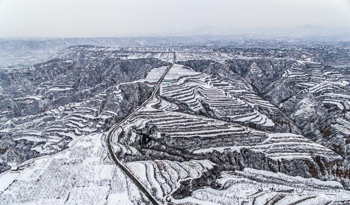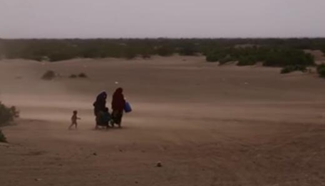ROME, Feb. 22 (Xinhua) -- Climate change is expected to be one of the main obstacles to feeding the world population, which is probably to top 10 billion by mid-century, according to a report on Wednesday from the United Nations Food and Agriculture Organization (FAO).
The Future of Food and Agriculture report notes that "millions of people depend on agriculture and are vulnerable to food insecurity" and that a changing climate would have an impact on "every aspect of food production."
The report said agriculture was one of the main contributors to the rising levels of greenhouse gases in the atmosphere, second only to energy production, noting that emissions from agriculture had doubled in the last 50 years and now totaled around 10.6 giga-tons per year, roughly equivalent to the emissions from the United States and the European Union combined.
It said that more sustainable agricultural policies would help reduce agriculture's impact on climate change.
In the report, FAO also noted that the adoption of "sustainable land, water, fisheries and forestry management practices" would help bridge the gap between current food production and that needed to feed a worldwide population in 2050.
The rest of the gap, the report said, could be made up by "agronomic adaptation," referring to the use of more appropriate plant species or more efficient irrigation methods, which can improve agricultural yields by up to 18 percent.
The FAO did say there would be some gains in crop yields from climate change, as different rainfall patterns and rising temperatures in colder regions would make those areas more usable. But the overwhelming impact of climate change would be negative.
The report also said that temperature increases would "cause local extinctions of some fish species at the edge of their range" in the medium term, and that physical and chemical changes to the sea would have more severe long-term impacts.
Overall, the FAO has "high confidence" that climate change will have a "substantial negative impact" on the food supply and quality of life.
In 2015, nearly 200 countries and regions agreed in Paris to work to reduce greenhouse gas emissions enough to keep global temperature rises to 2.0 degrees Celsius below levels of the Industrial Revolution, and for industrialized countries to help developing countries pay for the impacts caused by rising temperatures.
But the United Nations said pledges made ahead of the agreement in Paris were too weak to keep temperature rises to within the 2-degree target, and it has called for more ambitious goals.
For its part, the FAO has said that more efficient and sustainable agricultural methods should be a central part of the worldwide effort to reduce greenhouse gas emissions.












